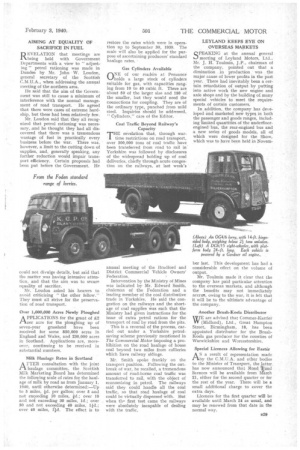Coal Traffic Beyond Railway's Capacity T HE revelation that, through warJ.
Page 49

If you've noticed an error in this article please click here to report it so we can fix it.
time restrictions on road transport, over 300,000 tons of coal traffic have been transferred from road to rail in Yorkshire was followed by disclosures of the widespread holding up of coal deliveries, chiefly through acute congestion on the railways, at last week's
annual meeting of the Bradford and District Commercial Vehicle Owners' Federation.
Intervention by the Ministry of Mines was indicated by Mr. Edward Smith, chairman of the Federation and a leading member of the coal distributive trade in Yorkshire. He said the congestion on the railways and the shortage of coal supplies was such that the Ministry had given instructions for the issue of extra petrol rations for the transport of coal by road from the pits.
This is a reversal of the process, carried out under a Yorkshire petrol savingscheme previously mentioned in The Commercial Motor imposing a prohibition on the road haulage of house coal beyond two miles from collieries which have railway sidings.
Mr. Smith spoke frankly on the transport position. Following the outbreak of war, he recalled, a tremendous amount of road-borne coal traffic was transferred to rail, with the object of economizing in petrol. The railways said they could handle all the coal traffic, so that road haulage of coal could be virtually dispensed with. But when tinfirst test came the railways were absolutely incapable of dealing with the traffic.








































































































